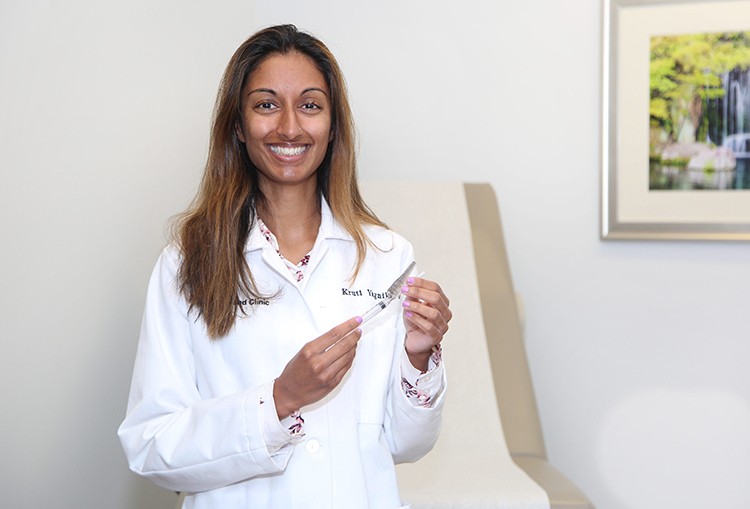
It is difficult to think about your child contracting a sexually transmitted infection. But you should, according to infectious disease doctors, and the time to give it thought and consider vaccinating your child against the Human Papillomavirus (HPV) is during their preteen years.
HPV, the most common sexually transmitted infection, “is spread by sexual contact – vaginal, anal and oral,” said Dr. Kruti Yagnik, an infectious disease doctor with Cleveland Clinic Indian River Hospital. “It can even be spread by close skin to skin contact. There are no signs or symptoms, but it can put you at risk for pre-cancer and cancer of the cervix, vagina and vulva in women, the penis in men, and the throat in men and women. That’s why everyone, male and female, should get the vaccine between the ages of 11 and 12 to reduce their risk of infection.”
According to the CDC, HPV is estimated to cause nearly 36,500 cases of cancer in men and women every year in the United States. HPV vaccination could eliminate 33,700 of these cancers by preventing the infections that cause them.
Since the HPV vaccination was first recommended in 2006, infections with HPV types that cause most HPV cancers and genital warts have dropped 88 percent among teen girls and 81 percent among young adult women. Among vaccinated women, the percentage of cervical precancers caused by HPV have dropped by 40 percent.
After decades of research, the United Kingdom implemented a human papillomavirus (HPV) vaccination program for teenage girls in 2008 and the results of a study released last November were astounding. Research funded by Cancer Research UK found that the HPV vaccinations reduced cervical cancer rates by almost 90 percent in women their 20s who were offered the vaccine at age 12-13.
“Studies like this are life-changing for physicians,” Dr. Yagnik revealed. “Thanks to medical science we can save so many lives with this preventative vaccine. We’ve got over 15 years of data with over 140 million doses of the vaccine administered and there are no side effects other than perhaps a sore arm at the shot site.”
Children ages 11-12 years should get two doses of the HPV vaccine, given six to 12 months apart.
The vaccines can be given as early as age 9. Children who start the HPV vaccine on or after their 15th birthday need three doses, given over six months. Once a child is fully vaccinated, the protection lasts the rest of their lifetime. Early protection works best because it protects children before they have contact with the virus.
Doctors say everyone through the age of 26 should get HPV vaccine if they weren’t fully vaccinated as a child, and in some cases adults age 27-45 might choose to get the HPV vaccine after speaking with their doctor about their risk for new HPV infections. The vaccine is less effective in adults, however, because most have already been exposed to HPV, giving the virus a foothold in the body.
“HPV can cause several different kinds of cancer, but only cervical cancer can be detected early with a PAP smear screening,” Dr. Yagnik explained. “The HPV vaccine protects against nine different strains, even the ones that show no symptoms and are not detected until they are more serious.”
While almost every unvaccinated person who is sexually active will get HPV at some time in their life, only a small percentage will end up with some type of cancer. And most HPV infections will eventually go away on their own. But the fact remains that 13 million Americans, including teens, will be infected with HPV every year. With such an effective vaccine available to fight such a widespread risk, vaccination is strongly recommended.
“Most of the time your pediatrician will bring up the timing of getting the HPV vaccine, but the parents should also be made aware,” Dr. Yagnik said. “And of course, young adults whose parents didn’t chose to have them vaccinated should be proactive. Women over the age of 30 who get a pap smear will automatically be tested for HPV because by that time it’s assumed that they’ve already been exposed to the virus. If they test positive for HPV, then the tests will be repeated every year or two and tracked closely. The key is to catch any abnormal cells in the cervix and remove them before they turn into cervical cancer.”
Those who develop a cancer caused by HPV will need treatment that can sometimes limit their ability to have children due to a hysterectomy, chemotherapy or radiation. More than nine out of 10 cases of cervical cancer are caused by HPV, but almost all can be prevented with the HPV vaccination.
Cervical cancer was once the leading cause of cancer death among women in the U.S., but HPV vaccines and cervical cancer screening have greatly reduced the incidence of the disease and made it one of the most preventable and treatable cancers.
Boys and men are not immune to HPV. The CDC states that four out of every 10 cases of cancer caused by HPV occur among men. Each year, more than 14,000 men in the U.S. contract an HPV related cancer.
“There’s really no good reason not to have your child vaccinated with the HPV vaccine,” Dr. Yagnik said. “A series of two or three shots could save their life.”
Dr. Kruti Yagnik received her medical education at Nova Southeastern College of Osteopathic Medicine in Fort Lauderdale, her internship and residency in Internal Medicine at Shands at the University of Florida, and her fellowship in Infectious Diseases and Geographic Medicine at the University of Texas Southwestern Medical Center. Her office is in the Health and Wellness Building, Suite 203, 3450 11th Court, Vero Beach. To schedule an appointment, call 772-794-5631.



